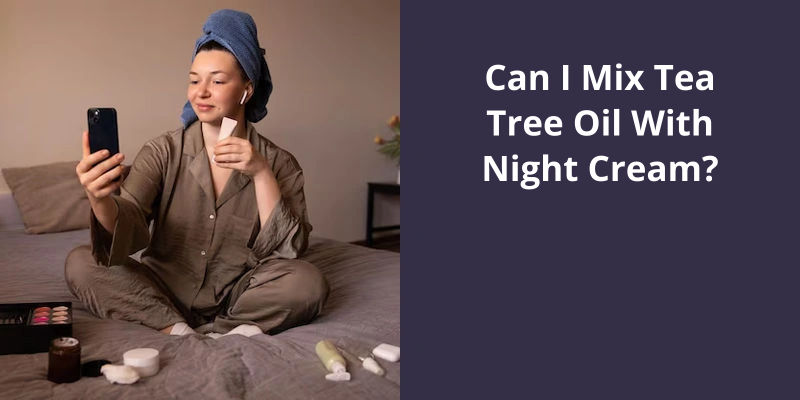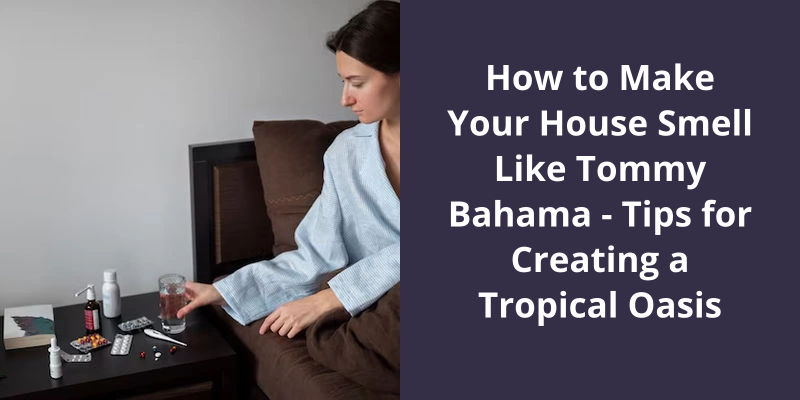Yes, you can mix tea tree oil with your night cream. The properties of tea tree oil include antibacterial and anti-inflammatory qualities which can help treat acne and ease skin inflammation. You should first do a patch test to ensure that it doesn’t irritate your skin. If there’s no adverse reaction, you can add a few drops of tea tree oil into your regular amount of night cream, then apply the mixture to your skin as usual. Always remember, essential oils are potent, so be cautious not to use more than the suggested few drops.

Should I Put Tea Tree Oil on My Face at Night?
Tea tree oil is known for it’s antibacterial and antifungal properties which make it a popular choice for natural skincare. However, it’s important to use it judiciously and safely, particularly if you plan to apply it on your face. While tea tree oil can be beneficial for reducing acne and preventing breakouts, it can also irritate or dry out the skin if used in excess. So, before you decide to put tea tree oil on your face at night, here are a few things to keep in mind.
It can help kill the bacteria that cause pimples and reduce inflammation. However, it’s important to use only a small amount and avoid using it on open wounds or broken skin. You can mix a few drops of tea tree oil with a witch hazel toner and apply it to your face after cleansing to help keep your skin clear and balanced.
Always use high-quality pure oil, test it on a small patch of skin first, and avoid using it on broken or irritated skin. If you’ve persistent acne or other skin concerns, it’s best to consult a dermatologist or a skincare professional for personalized advice.
The Benefits and Uses of Tea Tree Oil for Skin Beyond Acne: Tea Tree Oil Has Various Benefits for the Skin Beyond Reducing Acne and Preventing Breakouts. These Include Reducing Inflammation, Controlling Excess Oil Production, and Soothing Skin Irritation.
Tea tree oil has many skin benefits beyond acne, including reducing redness, controlling oil, and soothing irritation.
Tea tree oil has gained popularity as an ingredient in skincare products for it’s antibacterial and anti-inflammatory properties. However, using it with other products may raise concerns. One such query that often comes up is whether tea tree oil can be mixed with a moisturizer like Cetaphil. In this article, we explore this combination and it’s effects on the skin.
Can We Use Tea Tree Oil With Cetaphil Moisturizer?
Tea tree oil has been touted as a miracle cure for many skin conditions. On the other hand, Cetaphil moisturizer is a popular choice for individuals with sensitive skin due to it’s non-greasy formula that provides long-lasting hydration. It’s hypoallergenic and fragrance-free, which means it’s less likely to irritate the skin.
It’s important to note that tea tree oil is potent and should be used in small amounts. A little goes a long way, and the oil should be diluted before use. Mixing it with your Cetaphil moisturizer can help to dilute it, making it safer to use. You can start with one or two drops of tea tree oil and gradually increase the concentration as tolerated.
If you’ve sensitive skin, it’s best to patch test the mixture before using it all over your face. Apply a small amount on the inside of your wrist or elbow and wait for 24 hours to see if any adverse reactions occur. If you experience any redness, itching, or burning, stop using the mixture immediately.
However, it’s important to use it in small amounts and dilute it before use. Patch testing is also crucial for individuals with sensitive skin. If in doubt, it’s best to speak to a dermatologist before trying any new skincare products.
Tips for Using Tea Tree Oil Safely and Effectively
- Always dilute tea tree oil before topical use
- Test a small area of skin for allergies before use
- Don’t ingest tea tree oil
- Avoid using tea tree oil around the eyes
- Use caution when using tea tree oil on pets
- Store tea tree oil in a cool, dark place away from children
Conclusion
In conclusion, it’s important to take caution when mixing tea tree oil with other skincare products. It’s best to use tea tree oil as a standalone spot treatment, diluted in a carrier oil or added to a specialized product designed for targeted use. Always patch test and consult with a dermatologist if you’ve any concerns about incorporating tea tree oil into your skincare routine. Remember that skincare is a highly individualized practice, and what works for one person may not work for you. By taking a cautious and informed approach, you can incorporate tea tree oil into your routine in a safe and effective manner.





